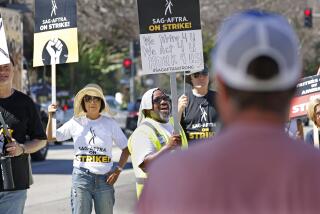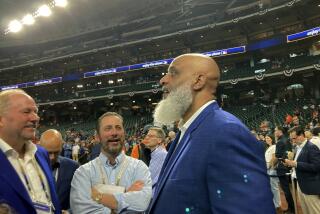Baseball Players Offer to End 232-Day Strike : Sports: Owners consider lockout vote. The union action comes after judge rules against team management.
- Share via
NEW YORK — Major league baseball players offered to end their 232 - day strike Friday, but that may not get them back on the field.
Team owners may respond to Friday’s legal developments with a lockout, in which case the season would probably begin with the replacement teams--made up mostly of minor leaguers and retired big leaguers--that were put together for spring training.
If that happens, there is no telling when, or if, the labor dispute that began last August, will end.
The players voted Wednesday to return to work if a federal judge granted the National Labor Relations Board’s request for a temporary injunction. The injunction was granted Friday by U.S. District Judge Sonia Sotomayor. It upholds the board’s claim of unfair labor practice by the owners and restores the terms of the expired bargaining contract between players and owners.
Said Sotomayor: “I have sided with the board in its argument that it has reasonable cause to believe that an unfair labor practice by the owners has occurred and that an injunction, albeit in a more limited form than requested, is just and proper to avoid irreparable injury to the collective bargaining process and to ensure that the owners and players continue bargaining in good faith. . . .”
The 1995 season is scheduled to start Sunday night with replacement players but owners will meet that afternoon in Chicago to discuss their options and possibly take a lockout vote.
A management official said the owners may opt for breathing room today by canceling all replacement games through Tuesday, when they will appeal the injunction. It may be unlikely that the union’s offer to end the strike will be accepted until then, the official said. It is even more unlikely that negotiations will resume before Sunday’s owners meeting, even though a recent exchange of proposals produced some optimism in the protracted stalemate, the official said.
Union leader Donald Fehr, hoping that the court ruling would be a turning point in the talks, said that “given the nature of the dispute” he would not be stunned if the owners implemented a lockout.
“However, it would be an obvious indication they want to continue the dispute,” he said.
Owners have said they would delay the season for as long as three weeks to give major league players a chance to get ready if a settlement was reached. But they have repeatedly said they will not play another season under terms of the previous economic system unless it is part of a long-term agreement in which a new system kicks in after the first year.
A lockout is the owners’ primary weapon, but it is not certain they have the 21 votes they need to approve it. A lockout also carries enormous financial risks. If an administrative law judge ultimately finds the owners guilty of unfair labor practice in a hearing that begins May 22, owners could be liable for back pay, plus interest, for all major leaguers from the time the lockout was implemented.
However, acting Baseball Commissioner Bud Selig has seldom put an issue to a vote without knowing he has the votes to get it through.
He released a statement Friday, saying he was disappointed with the ruling and that it “may represent a step backward” in the negotiations.
“The two sides still have to settle their disagreements at the . . . table,” he said. “The economic uncertainty caused by delays . . . could have further crippling effects on the industry. Representatives of the 28 clubs will meet to discuss legal and practical options now available and will certainly give the players a timely answer to their offer to return to the field.”
In the meantime, the U.S. 2nd Circuit Court of Appeals denied a request by management lawyers for an emergency stay of the injunction, but the lawyers will return Tuesday to argue for a stay and an accelerated appeal.
*
In the appellate brief, club lawyers said the injunction could prove catastrophic, leading to a “second consecutive year of no playoffs, no World Series and . . . irreparable damage to the credibility of the institution in the eyes of its fans, advertisers, rights holders and other sources of economic lifeblood.”
Those views seem based on the possibility of the game ending up where it was when the players walked out last Aug. 12--another season played under the previous work rules, with no labor agreement, sporadic negotiations and the possibility of another strike to forestall another attempt by the owners to declare an impasse and unilaterally implement a new economic system.
Asked if the players would agree to end the strike and return to work with a no-strike pledge, Fehr would not comment Friday, but a management source said he has been told by Fehr that the union would agree if owners pledged not to implement.
Owner Peter Angelos of the Baltimore Orioles hinted that owners talked about such an exchange during a conference call Friday.
“I believe there is a consensus among owners for a side understanding,” he said. “The ’95 season has to be completed and the World Series played. No work stoppage (by the players) and no unilateral action by ownership.”
Friday’s injunction stemmed from the owners’ attempt to declare an impasse and implement a salary-cap system on Dec. 22. In charges brought by the union, the labor board ultimately cited the owners with a violation of the National Labor Relations Act for illegally declaring an impasse. However, in a move tantamount to a plea bargain with the board, the owners avoided sanctions on Feb. 3 by agreeing to withdraw the implemented system and restore the terms and conditions of the expired agreement.
Three days later, however, the owners’ Player Relations Committee said it would serve as the exclusive bargaining agent for the 28 clubs--the equivalent of a signing freeze--and unilaterally eliminated three key provisions of the agreement the owners had agreed to restore: salary arbitration, free-agent bidding and the anti-collusion clause.
The union brought new charges of unfair labor practice that the NLRB supported in its petition for an injunction that forces owners to restore those provisions.
In a 35-page brief filed with the court this week, NLRB lawyers wrote that there is reasonable cause to believe the owners’ unilateral changes again violated the National Labor Relations Act. The injunction, they wrote, “is necessary to prevent further harm to the collective bargaining process.”
In the same courtroom in which former union leader Marvin Miller began to overturn baseball’s historic reserve system in 1970 by arguing for free agency on behalf of Curt Flood, Sotomayor agreed on all counts, saying the owners had done irrevocable damage to both the bargaining process and wage scale.
“The owners misunderstand the case law,” she said, ordering them to restore salary arbitration, free-agent bidding and the anti-collusion clause; to rescind any action inconsistent with the former terms and conditions, and to bargain in good faith.
She said the injunction will remain in effect until there is a settlement, disposition of the NLRB case on unfair labor practice, or a court-approved declaration of impasse, at which time management can make unilateral changes in conditions that are normally mandatory subjects of collective bargaining.
*
Fehr said the ruling “provided every bit of relief we asked for” and substantiated his contention that it has been impossible to reach a bargaining settlement because “the owners have not lived up to their obligation under labor law to negotiate in good faith.”
Although an agreement seems closer than ever, it is not certain the injunction will spur talks, as Fehr hoped.
“We’re ready to resume bargaining immediately,” he said.
“There is no reason we can’t reach an agreement promptly. We have an opportunity to rebuild the game.”
But there still is disagreement on the rate of a payroll tax and the figure at which it would be triggered. The latest management proposal calls for a 50% tax on team payrolls of $44 million and higher. The union views that as a form of salary cap. It is proposing a 25% tax on payrolls of $50 million and more.
Fehr said he was hopeful of working with Selig on an orderly return of the striking players, about 800 of whom are still unsigned for 1995. He said that if there is no lockout, they could be in their spring camps early next week.
(BEGIN TEXT OF INFOBOX / INFOGRAPHIC)
Strike’s End in Sight?
The ruling Friday brings the baseball strike to a head. The question now is what the owners will do.
Actions This Week
Monday: NLRB, the federal agency overseeing union-management issues, requests an injunction restoring free-agent bidding and salary arbitration. The two practices had been rescinded by owners in December. That move violated labor law, NLRB says.
Wednesday: The union’s executive board votes to end the strike and begin spring training if judge issues injunction.
Thursday: Owners vote to authorize use of replacement players. Striking players submit new proposal.
Friday: Injunction granted. Judge rules against owners, saying they violated federal labor law. It effectively ends 232-day strike.
Sunday: Owners expected to vote on whether to allow the players to come back. They need 21 of 28 votes.
The Next Step
The two options that owners have now that players have ended strike:
Players allowed back: If owners allow players to come back to work, spring training would begin and season would likely start in a few weeks.
Players locked out: If owners vote to lock out players, season would start Sunday with replacement players.
Source: Times staff and wire reports
* Related story, C1
More to Read
Go beyond the scoreboard
Get the latest on L.A.'s teams in the daily Sports Report newsletter.
You may occasionally receive promotional content from the Los Angeles Times.










